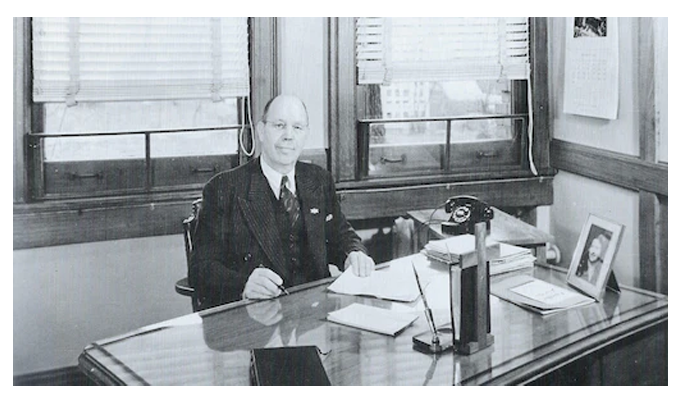
In reading many missionary biographies, we have noticed that missions and financial provision are closely connected. Even when missionaries do not share their needs with others, they pray much about God’s providing their daily bread. While they appreciate letters from home, they greatly value the generosity when a cheque is included (or nowadays perhaps an e-transfer). We know many missionaries having huge kingdom impact, who hate talking about finances with their supporters. For missionaries living on the edge, a major new donor can sometimes mean the difference between breaking new ground or perhaps folding up shop. RG LeTourneau was the kind of supporter that many missionaries dream about. In his generosity he gave away 90 percent of his income to missions and ministry, and lived on 10 percent.
Many people see Letourneau as one of the most influential people of the 20th century. As the father of the modern earthmoving industry, he was responsible for 299 inventions. These inventions included the bulldozer, scrapers of all sorts, dredgers, portable cranes, rollers, dump wagons, bridge spans, logging equipment, mobile sea platforms for oil exploration, and many others. He introduced into the earthmoving and material handling industry the rubber tire, which today is almost universally accepted. He invented and developed the Electric Wheel. When he was 70, LeTourneau developed a digger that scooped up 150 tons of dirt in two minutes (one gulp each of two 75-ton buckets).
As told in his biography Mover of Mountains and Men, LeTourneau experienced an amazing ‘rags to riches’ story. Born in 1888 in Richford, Vermont, Robert Gilmore (R.G.) LeTourneau struggled in school before dropping out at age 14. In the early 1900s, ninety-six percent of children aged 12 and older dropped out of school to join the workforce. Robert took on a job at the East Portland Iron Works and, shortly thereafter in Stockton, California, where his first job was transporting earth to level out farmland. His frustrations with moving dirt drove him to eventually find a better, more efficient way. In his early years, he worked as an ironmonger, lead burner, bricklayer, carpenter, gold miner, stump puller, ditch digger, wood chopper, farmer, battery refurbisher, construction worker, tractor repairman, and field leveller.
Once after modifying a car for a local race, he broke his neck when the car crashed. Ending up in hospital, he met his future wife Evelyn Peterson, marrying her in 1917. His neck injury prevented him from serving directly in the First World War. While serving at the Mare Island Navy Yard north of San Francisco, he nearly died of the 1918 Spanish Flu Pandemic. Sadly, their one-year-old son Caleb did not survive the Pandemic.
It was during these difficult years, through the influence of his sister (a missionary in China) and a pastor that he decided that he would be God’s businessman. LeTourneau’s own pastor told him that God needs business people as well as pastors and missionaries. In 1922 at age 32, he constructed the first all-welded scraper that was lighter, stronger and less expensive than any other machines. In the early 1900s, mules or tractors pushing scraper blades were the only way to move dirt, apart from using a shovel. LeTourneau’s new scraper could be pulled and operated by a single person, rather than the two previously required. He was a mechanical genius who built the first diggers and bulldozers. As a result, R.G. LeTourneau, Inc. was birthed in 1929. The Great Depression nearly bankrupted this fledgling company. But, by 1934, sales had risen to nearly $1 million. Over the next decade, LeTourneau opened new plants in Toccoa, Georgia; Rydalmere, Australia; Vicksburg, Mississippi; Stockton-on-Tees, England and in Longview, Texas. When asked how many people worked for him, he humorously said of his six thousand employees: “Probably half of them”.
In his building huge earth-moving machines, he reminds many of the cartoon character Bob the Builder. During World War II, he produced seventy percent of all the army’s earth-moving machinery. Many see his extensive road building as strategically shortening the length of WWII. He spoke of God as the Chairman of his Board. RG LeTourneau is perhaps the most moving Christian inventor, business person and entrepreneur the world has ever seen. His life’s verse was Matthew 6:33: “Seek ye first the kingdom of God and His righteousness and all these things shall be added unto you.”
As a special friend of Billy Graham for many years, LeTourneau invested heavily in his crusades. He also founded LeTourneau University in 1946 that is thriving to this day in Longview, Texas. LeTourneau initiated missionary efforts in Liberia, Africa and Peru, South America that involved both evangelistic and economic enterprises. Over the years, he served as a leader in the Christian & Missionary Alliance, as president of the Christian Businessmen’s Committee (CBMC) and as president of the Gideons International which distributes bibles globally. He saw every workplace in every nation as his mission field.
As a multi-millionaire, LeTourneau said that the money came in faster than he could give it away. LeTourneau was convinced that he could not out-give God. “I shovel it out,” he would say, “and God shovels it back, but God has a bigger shovel.”
LeTourneau’s example reminds me that we too can be missionary mountain-movers. As Jesus said in Matthew 17:20, “I tell you the truth, if you have faith as small as a mustard seed, you can say to this mountain, ‘Move from here to there’ and it will move. Nothing will be impossible for you.” RG LeTourneau once said: “You will never know what you can accomplish until you say a great big yes to the Lord.” My prayer for those reading this article is that God may raise up many generous givers who, like LeTourneau, will be movers of mountains and missions.

Leave a Reply